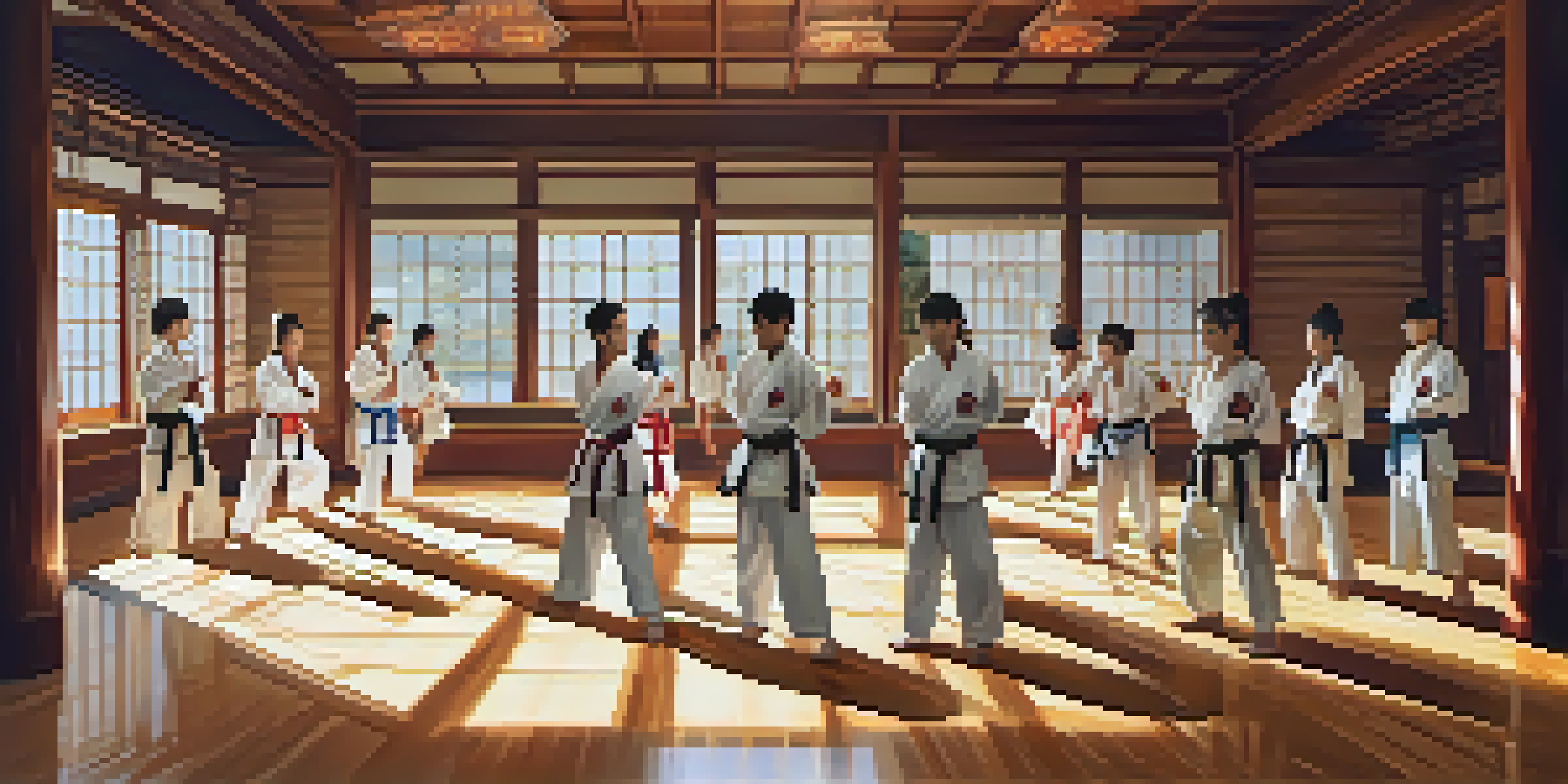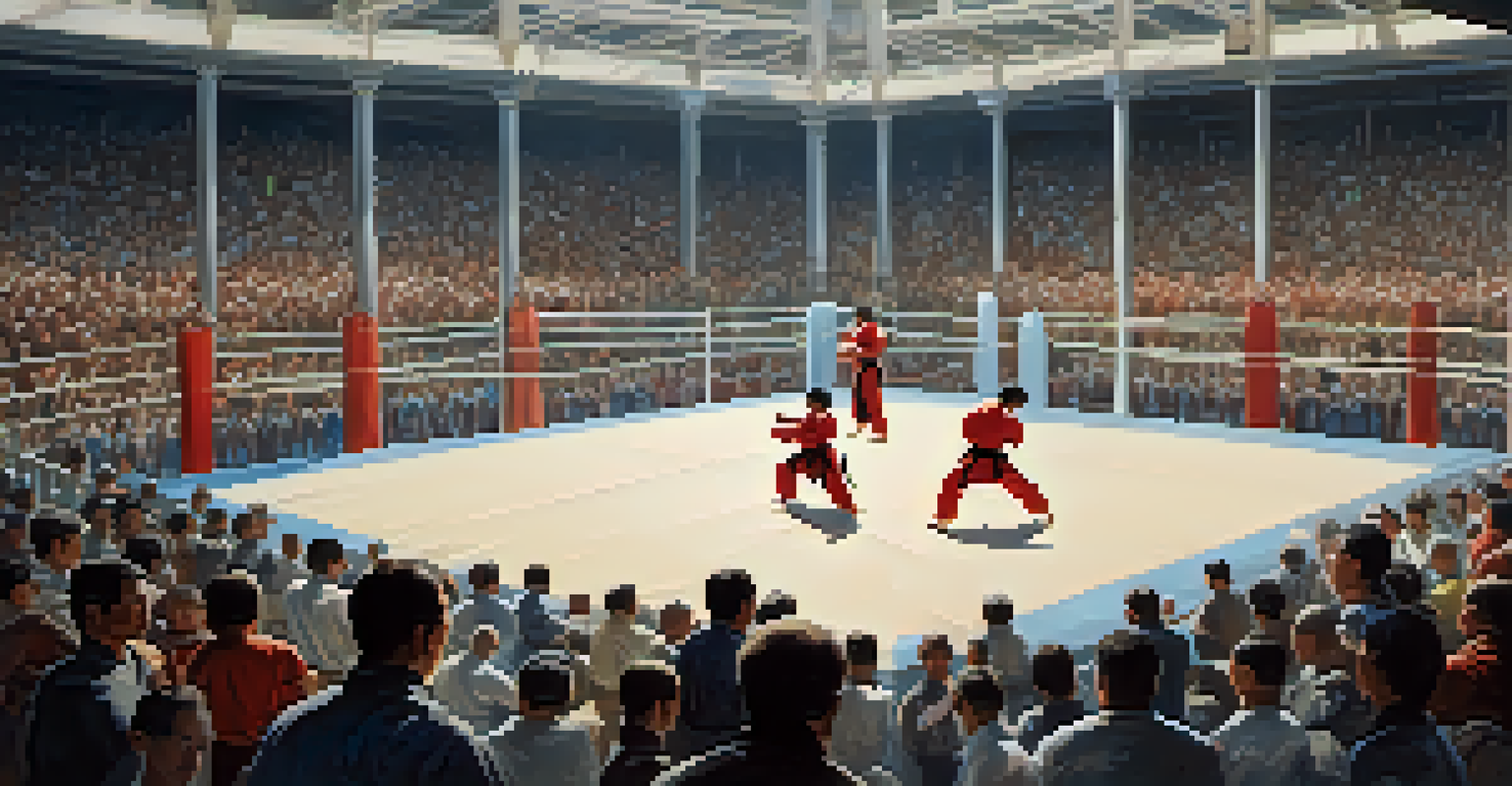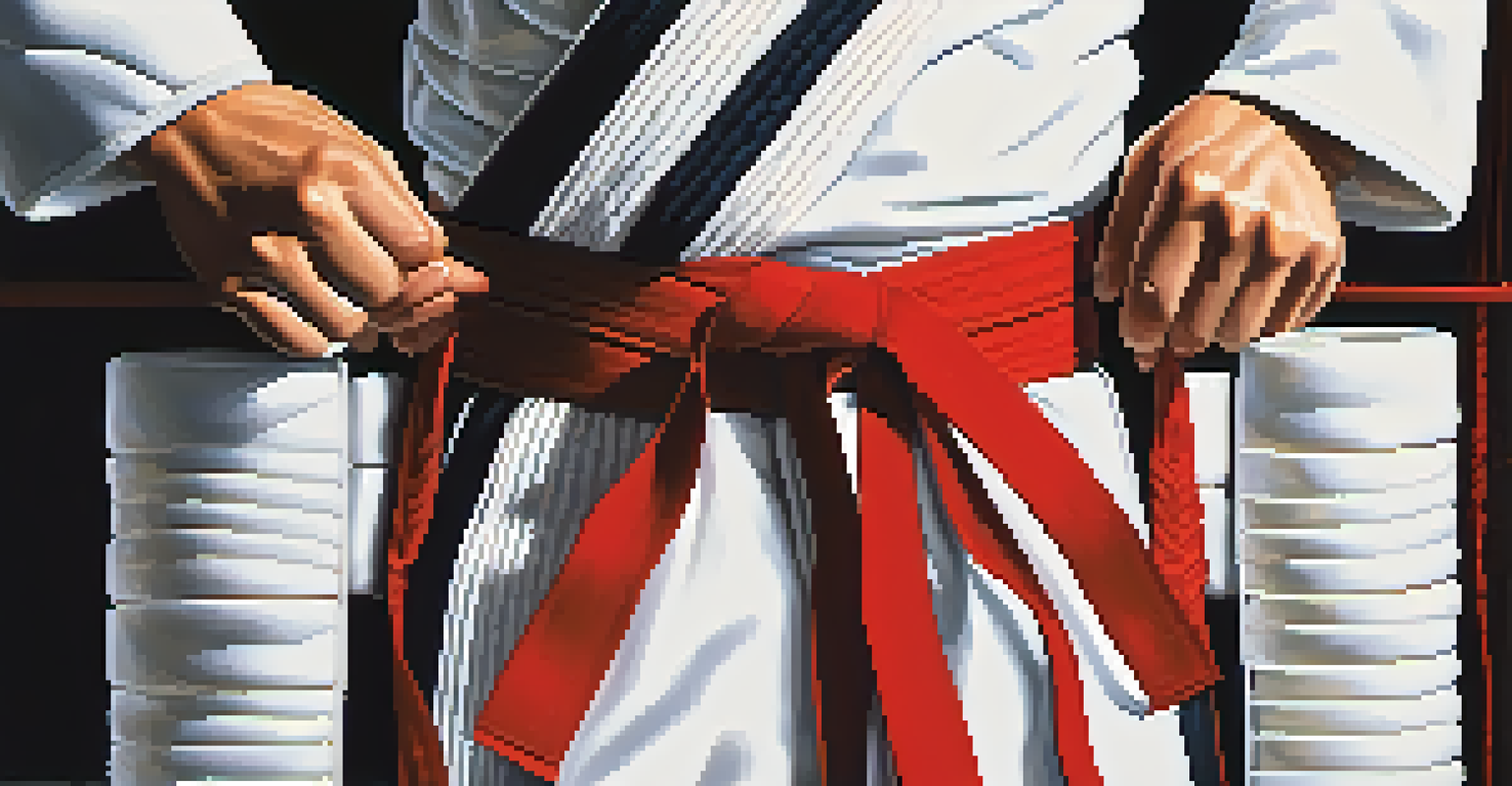Self-Discipline in Martial Arts and Its Social Implications

Understanding Self-Discipline in Martial Arts Training
Self-discipline is the cornerstone of martial arts training, guiding practitioners through rigorous routines and challenges. In martial arts, it’s not just about physical strength; it’s about mental resilience and commitment. This discipline fosters a mindset where students learn to push through discomfort and stay focused on their goals, whether that's mastering a technique or preparing for a competition.
Discipline is the bridge between goals and accomplishment.
For example, consider a karate student training for a black belt. The journey involves countless hours of practice, conditioning, and sparring, all requiring a steadfast commitment. Each session builds not only skill but also a sense of accountability to oneself and one's instructor. This process imbues practitioners with a deeper understanding of what it means to persevere.
Furthermore, self-discipline in martial arts extends beyond the dojo. It teaches valuable life skills such as time management, respect, and emotional control. These traits often carry over into everyday life, helping students navigate challenges with a more disciplined and focused approach.
The Role of Self-Discipline in Personal Growth
Engaging in martial arts often serves as a catalyst for personal growth, primarily through the practice of self-discipline. When individuals commit to their training, they not only enhance their physical abilities but also cultivate a stronger character. This transformation can lead to increased self-esteem and a more positive self-image.

Take, for instance, a teenager struggling with self-confidence. By immersing themselves in martial arts, they learn to set achievable goals, celebrate their progress, and confront their fears. Each belt earned or technique mastered becomes a testament to their hard work, instilling a sense of accomplishment that spills over into other aspects of life.
Self-Discipline Fuels Personal Growth
Martial arts training enhances self-discipline, which fosters personal development and boosts self-esteem.
As students progress, they often find that their self-discipline empowers them to tackle challenges in school, work, and relationships. This newfound confidence and resilience can significantly alter their social interactions, encouraging them to take on leadership roles or engage more actively in their communities.
Self-Discipline and Respect in Martial Arts Culture
Martial arts are steeped in tradition, where respect for instructors, peers, and the art itself is paramount. Self-discipline plays a crucial role in nurturing this respect, as practitioners are taught to honor their training and those who guide them. This cultural aspect fosters a sense of community among students.
The greatest weapon against stress is our ability to choose one thought over another.
For example, in many dojos, students bow to their instructors and each other as a sign of respect before and after training sessions. This ritual reinforces the idea that martial arts are not just about individual achievement but also about collective growth and support. Through self-discipline, students learn to appreciate the contributions of others, creating a harmonious environment.
Moreover, this culture of respect often transcends the dojo, influencing how practitioners interact in their daily lives. As they embody the values learned through martial arts, they become more considerate and empathetic individuals, positively impacting their social circles and communities.
Social Implications of Self-Discipline in Martial Arts
The self-discipline cultivated in martial arts has significant social implications, particularly in shaping community dynamics. When individuals embody discipline, they often become role models who inspire others to pursue their own goals. This ripple effect can lead to more engaged and proactive communities.
For instance, many martial arts schools offer outreach programs for at-risk youth, teaching them the values of discipline and respect. These programs can transform lives by providing a structured environment where young people learn to channel their energy positively. As these youths develop self-discipline, they often experience improved behavior and academic performance.
Respect Builds Community in Dojos
The culture of respect in martial arts promotes community and supports interpersonal relationships among practitioners.
Additionally, the principles of self-discipline in martial arts promote conflict resolution and non-violence. Practitioners learn that true strength lies not in aggression but in the ability to remain calm and composed. This perspective can lead to more peaceful interactions within communities, fostering understanding and cooperation.
Building Resilience Through Martial Arts Training
Resilience is a vital quality that martial arts training instills in its practitioners through self-discipline. The rigorous training routines challenge both the body and mind, teaching individuals how to bounce back from failures and setbacks. This resilience becomes a vital tool in facing life's various challenges.
Consider a martial artist who faces a tough opponent in a tournament. The discipline they've developed through countless hours of training allows them to remain composed under pressure, adapt their strategy, and learn from the experience, regardless of the outcome. This ability to navigate adversity is invaluable in everyday life, where challenges arise unexpectedly.
Moreover, this resilience often encourages a growth mindset—understanding that abilities can be developed through dedication and hard work. As practitioners embrace this philosophy, they become more open to learning from their mistakes, ultimately leading to personal and social growth.
The Impact of Self-Discipline on Mental Health
Engaging in martial arts can significantly enhance mental health, largely due to the self-discipline involved in training. Regular practice encourages mindfulness and self-awareness, helping individuals manage stress and anxiety more effectively. The structured environment of martial arts provides a sense of routine that can be comforting in uncertain times.
For instance, many practitioners find that the focus required during training sessions acts as a form of meditation. This mental clarity allows them to process their thoughts and emotions, resulting in improved mental well-being. Over time, the discipline developed in martial arts can lead to better coping strategies and emotional regulation.
Resilience Through Rigorous Training
Martial arts training develops resilience, allowing individuals to effectively navigate life's challenges and setbacks.
Additionally, the community aspect of martial arts provides essential social support, further bolstering mental health. Practitioners often form strong bonds with their peers, creating a network of encouragement and understanding. This sense of belonging can be particularly beneficial for those experiencing loneliness or social anxiety.
Conclusion: The Broader Significance of Self-Discipline
Ultimately, the self-discipline fostered through martial arts transcends the physical realm, impacting personal growth and community dynamics. By instilling values such as respect, resilience, and mental fortitude, martial arts practitioners become not only skilled fighters but also positive contributors to society. This holistic development highlights the broader significance of self-discipline.
Moreover, as individuals become more disciplined, they often inspire those around them to pursue their own self-improvement journeys. Whether through mentorship roles or community outreach, martial artists have the potential to uplift others, creating a cycle of growth and empowerment. This ripple effect can lead to more cohesive and supportive communities, where individuals uplift one another.

In conclusion, self-discipline in martial arts is more than just a personal achievement; it’s a powerful force for social change. As martial arts continue to grow in popularity, their emphasis on discipline can serve as a beacon for individuals seeking personal and communal transformation.